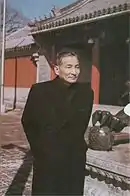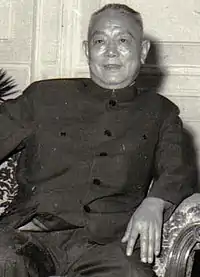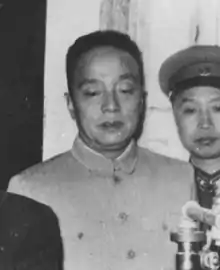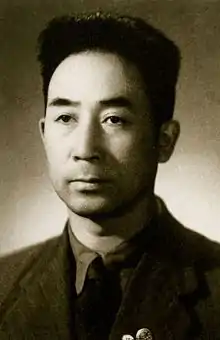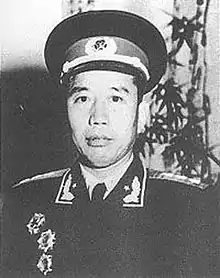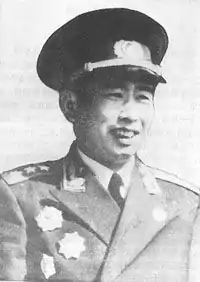Eight Elders
The Eight Great Eminent Officials (Chinese: 八大元老; pinyin: Bā dà yuánlǎo), abbreviated as the Eight Elders (Chinese: 八老; pinyin: Bā lǎo), were a group of elderly members of the Chinese Communist Party (CCP) who held substantial power in the last two decades of the 20th century. In the English-speaking world, these men are often called The Eight Immortals as an allusion to the Taoist deities commonly known as the Eight Immortals.[1]
Deng Xiaoping, who emerged as China's top leader in December 1978, as a result of the 3rd Plenary Session of the 11th Central Committee, was the most powerful of the group, but his power was never absolute, and he had to consult and make compromises with the other seven Elders, of whom the most prominent were Chen Yun and Li Xiannian (considered the second and third in power, respectively, and both associated with the leftist hard-liners and opposition to reform).[2] Deng's allies among the Elders included Yang Shangkun and Peng Zhen. However, by the late 1980s, all Elders, including Deng himself, were united in opposition to further political reforms, while holding different views in economic and foreign affairs.
According to reformist General Secretary Zhao Ziyang, of all the Elders, Li Xiannian was the most prominent, most active and most successful in opposing and blocking changes and reforms in both political and economic issues.[2] Important decisions were often made in Deng's home. The Eight Elders were able to remove three Party leaders. Hua Guofeng was gradually removed from Premier and Party Chairman between 1980 and 1981; Hu Yaobang was removed in 1987; and, Zhao Ziyang was removed in 1989.[3]
Membership
The Eight elders were:
Descendants
Descendants of the Eight Elders who have benefited significantly from nepotism and cronyism constitute a group now known as "the Princelings" or the "Crown Prince Party". Its members, rising through party ranks, can easily overrule any opposition in their jurisdictions, even if they are assigned to a local administrative position. They are often seen to outrank other party officials and possess greater prestige due to their lineage.[3] Bloomberg has reported on the extensive wealth accumulated by these descendants via their roles in various public and private companies.[4]
See also
References
- Joseph, William A. (2010). Politics in China: An Introduction. Oxford: Oxford University Press. p. 112. ISBN 978-0-19-533530-9.
- MacFarquhar, Roderick. "Foreword" in Zhao Ziyang (2009). Prisoner of the State: The Secret Journal of Zhao Ziyang. New York, NY: Simon and Schuster. ISBN 1-4391-4938-0
- Xiang, Lanxin (Apr 20, 2012). "Bo Xilai probe shows up China's outdated system of government". South China Morning Post
- "Heirs of Mao's Comrades Rise as New Capitalist Nobility". Bloomberg. Archived from the original on December 27, 2012. Retrieved December 28, 2012.
External links
- AsiaWeek article
- John Ruwitch 'China's leaders tug strings of power in retirement' (Reuters)
.jpg.webp)
